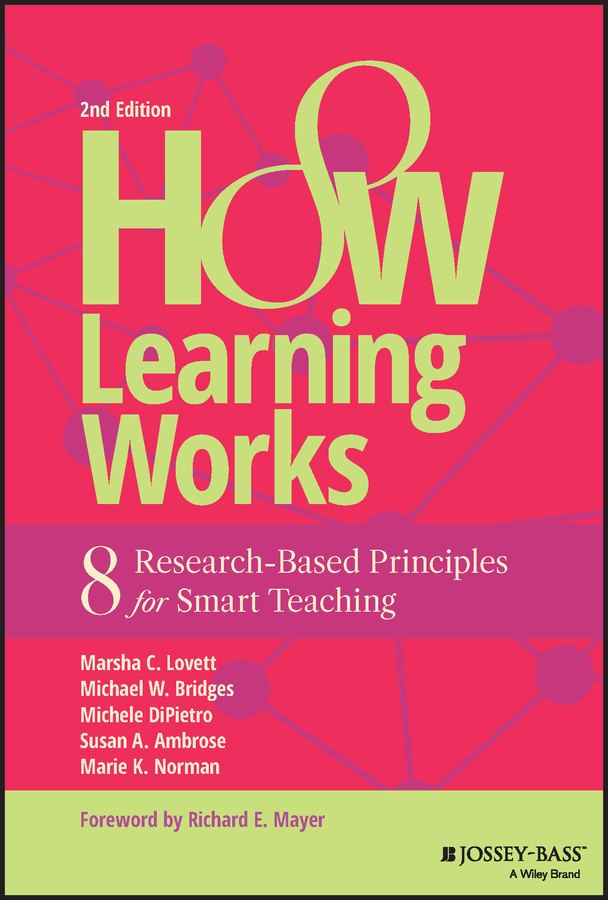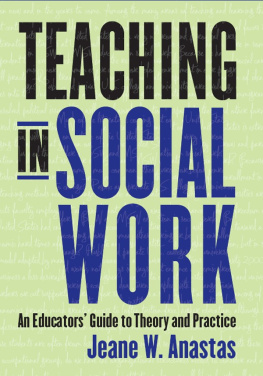
Table of Contents
List of Tables
- Appendix G
- Appendix H
List of Illustrations
- Chapter 1
- Chapter 2
- Chapter 3
- Chapter 4
- Chapter 5
- Chapter 6
- Chapter 7
- Chapter 8
- Appendix B
- Appendix C
- Appendix D
- Appendix E
- Appendix F
- Appendix G
- Appendix I
- Appendix J
Guide
Pages
Praise for How Learning Works, 2e
Since the publication of the original How Learning Works, I have returned again and again to its thorough and readable summaries of the most important research on student learning. This second edition has become an even more essential resource for faculty, as the authors have infused the book's recommendations with greater awareness of the social, emotional, and cultural factors that impact student identity and development.
James Lang, author of Small Teaching
How Learning Works is a poignant and provocative book that engages meaningfully and intentionally with the intellectual and affective dimensions of teaching and learning that shape our complex and diverse higher education classrooms. Presenting a wellresearched, relevant, and socially conscious range of cognitive and social principles and practices, the authors explore what it means to engage intentionally with students as whole beings, in a socially just, inclusive, and pedagogically responsible way.
Kasturi BehariLeak, dean of the Centre for Higher Education Development, University of Cape Town
The Second Edition of How We Learn is superb. I particularly admire its breadth of coverage, which includes socioemotional and cognitive components of learning. I highly recommend it for anyone at any level in education.
Henry L. Roediger, III, James S. McDonnell Professor of Psychology; Washington University in St. Louis; coauthor of Make It Stick: The Science of Successful Learning
How Learning Works is the essential book on teaching and learning in higher education. The new edition is even better than the original. Drawing deeply on recent research to outline eight principles of how learning works, the authors provide practical guidance to put those principles into action. This book is smart, useful, and inspiring!
Peter Felten, executive director, Center for Engaged Learning, Elon University
This book provides tremendous benefits to anyone who wants to engage students and facilitate learning in a higher education context. The authors have pruned the extensive research about how learning works into eight principles and their associated implications. Each chapter contains relatable challenges and offers evidencebased approaches for addressing them.
Bonni Stachowiak, host + producer, Teaching in Higher Ed Podcast
How Learning Works is the perfect title for this excellent book. Drawing upon new research in psychology, education, and cognitive science, the authors have demystified a complex topic into clear explanations of eight powerful learning principles. Full of great ideas and practical suggestions, all based on solid research evidence, this book is essential reading for instructors at all levels who wish to improve their students' learning.
Barbara Gross Davis, assistant vice chancellor for educational development, University of California, Berkeley, and author, Tools for Teaching
As you read about each of the eight basic learning principles in this book, you will find advice that is grounded in learning theory, based on research evidence, relevant to college teaching, and easy to understand. The authors have extensive knowledge and experience in applying the science of learning to college teaching, and they graciously share it with you in this organized and readable book.
Richard E. Mayer, professor of psychology, University of California, Santa Barbara; coauthor, eLearning and the Science of Instruction; author, Multimedia Learning
How Learning Works
8 ResearchBased Principles for Smart Teaching
Second Edition
Marsha C. Lovett,
Michael W. Bridges,
Michele DiPietro,
Susan A. Ambrose,
Marie K. Norman

Copyright 2023 by John Wiley & Sons Inc. All rights reserved.
Published by John Wiley & Sons, Inc., Hoboken, New Jersey. Published simultaneously in Canada.
Except as expressly noted below, no part of this publication may be reproduced, stored in a retrieval system, or transmitted in any form or by any means, electronic, mechanical, photocopying, recording, scanning, or otherwise, except as permitted under Section 107 or 108 of the 1976 United States Copyright Act, without either the prior written permission of the Publisher, or authorization through payment of the appropriate percopy fee to the Copyright Clearance Center, Inc., 222 Rosewood Drive, Danvers, MA 01923, (978) 7508400, fax (978) 7504470, or on the web at www.copyright.com. Requests to the Publisher for permission should be addressed to the Permissions Department, John Wiley & Sons, Inc., 111 River Street, Hoboken, NJ 07030, (201) 7486011, fax (201) 7486008, or online at www.wiley.com/go/permission.
Certain pages from this book (except those for which reprint permission must be obtained from the primary sources) are designed for educational/training purposes and may be reproduced. These pages are designated by the appearance of copyright notices at the foot of the page. This free permission is restricted to limited customization of these materials for your organization and the paper reproduction of the materials for educational/training events. It does not allow for systematic or largescale reproduction, distribution (more than 100 copies per page, per year), transmission, electronic reproduction or inclusion in any publications offered for sale or used for commercial purposesnone of which may be done without prior written permission of the Publisher.
Trademarks: Wiley and the Wiley logo are trademarks or registered trademarks of John Wiley & Sons, Inc. and/or its affiliates in the United States and other countries and may not be used without written permission. All other trademarks are the property of their respective owners. John Wiley & Sons, Inc. is not associated with any product or vendor mentioned in this book.
Limit of Liability/Disclaimer of Warranty: While the publisher and author have used their best efforts in preparing this book, they make no representations or warranties with respect to the accuracy or completeness of the contents of this book and specifically disclaim any implied warranties of merchantability or fitness for a particular purpose. No warranty may be created or extended by sales representatives or written sales materials. The advice and strategies contained herein may not be suitable for your situation. You should consult with a professional where appropriate. Further, readers should be aware that websites listed in this work may have changed or disappeared between when this work was written and when it is read. Neither the publisher nor authors shall be liable for any loss of profit or any other commercial damages, including but not limited to special, incidental, consequential, or other damages.
For general information on our other products and services or for technical support, please contact our Customer Care Department within the United States at (800) 7622974, outside the United States at (317) 5723993 or fax (317) 5724002.
Next page







